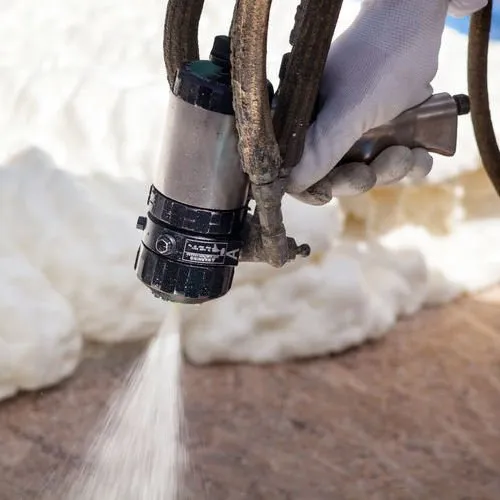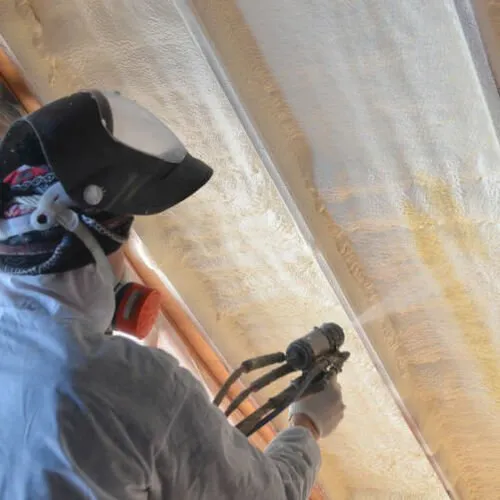What is the Best Insulation for the Attic? | Foam Tech
Is Spray Foam Good Insulation For Attics?
If you are considering insulating your attic with spray foam, you will want to consider spray foam attic insulation benefits and its disadvantages.
Here are some of the pros and cons to using spray foam in your attic.

Spray Foam Attic Insulation Pros and Cons:
Pros
- Provides a difficult-to-break airtight seal in the attic that prevents airflow and condensation. It also does not absorb moisture.
- Creates an insulating barrier that’s at least 30% more energy efficient than other types of insulation.
- Deters mold and mildew growth, as well as pest infestation.
- Lasts for decades, and does not lose its R-value, or the measure that rates how well insulation resists heat transfer.
- It strengthens the roof and improves its ability to withstand winds.
Cons
- It may not be able to reach every cavity, which can decrease its overall efficiency, and increases the risk of water damage.
- It can sometimes shrink as it ages and pull away from framing.
- Requires skilled technicians to install correctly.
- May not meet insulation code standards in some areas.
- Installation costs may be higher than other types of insulation.
Overall, spray foam insulation has more benefits for your attic than it does disadvantages. If you are considering installing spray foam insulation in Dallas, TX, consult with the professionals at Foam Tech. Schedule an installation by contacting us today!
Spray foam insulation can be used for both residential and commercial buildings. While spray foam is useful for keeping moisture out of your attic, if your business has a plumbing leak, you’ll want to find a plumber that specializes in commercial plumbing to repair leaks that could affect the whole building.
Will Adding Spray Foam Insulation To My Attic Make A Difference?
Any insulation in your attic is better than none, whether it’s fiberglass or spray foam. While most homes have attic insulation, that insulation may not be adequate when it comes to maintaining your home’s energy efficiency. Keeping your home comfortable requires a lot of energy, and upgrading the insulation in your attic is one way to reduce energy use and heat loss. Without adequate insulation, you can lose up to 20% of your conditioned air through your attic and roof.
The best way to determine if you have enough insulation is to measure its R-value, or its resistance to heat transfer. Most home builders and HVAC experts recommend an R-value of 30, which means your attic should have at least 8.5 inches of insulation on the attic flooring, as well as insulation around all attic openings.
How Much Does It Cost To Insulate An Attic?
The costs are going to vary depending on the size of your attic, the kind of material used, and how much is used. The average cost in the U.S. to install insulation runs between $1,700 and $2,100. Loose fill or blown-in insulation is the cheapest to install. A bag of this type of insulation can be bought for about $12 and will cover about 40 square feet. Batt fiberglass insulation that’s rolled onto the attic flooring costs about $0.40 per square foot.
If you are applying spray foam and wondering, “How much does it cost to spray foam insulate an attic?” the answer is that spray foam insulation costs $1 to $1.20 per square foot for open cell foam and about $1.25 to $1.50 per square foot
Spray Foam Attic Insulation Vs. Fiberglass
Usually, most homeowners will tend to choose between spray foam insulation and fiberglass insulation when it comes to installing insulation in their attics. Almost 85% of all homes in the U.S. have fiberglass insulation. While it’s cheaper to install, it’s often less effective than spray foam, especially in extremely cold weather. Fiberglass insulation is also prone to air leakage, whereas spray foam insulation is generally airtight. Fiberglass also has a lower R-value than spray foam, at 2.2 per inch compared to 3.5 per inch for open cell spray foam or 6 to 7 per inch for closed cell spray foam.
Is Spray Foam Insulation Worth It?
While spray foam insulation generally costs more to install than other insulation, it often makes up for it in the long term in energy efficiency. Spray foam attic insulation energy savings range between 15% to 50% on energy bills. You’ll also notice a distinct difference in comfort levels inside your home. Because spray foam seals up spaces when properly installed, it keeps more of your conditioned air inside the home. This also causes your air conditioner or heater to run less, while still keeping your home comfortable.
How Thick Should Spray Foam Insulation Be In Attic?
How thick you apply spray foam insulation will depend on where it’s going to be applied, and whether you are using open cell or closed cell foam insulation. In general, for open cell spray foam insulation you should spray in about 6 inches of foam on the roof deck. With closed cell foam about 4 to 5 inches should be sprayed on the roof deck.

Schedule An Spray Foam Insulation Today
Whether you want to add insulation or replace it, if you want the best value you should consider installing spray foam insulation in Dallas, Fort Worth, San Antonio, Corpus Christi, & Lubbock, TX. For installation services schedule the experienced professionals at Foam Tech by calling 855-794-3626 (FOAM) or contacting us today!
GET IN TOUCH
We are the undisputed leader for the application of spray foam roofing, insulation, and roof coatings. Foam Tech can provide unparalleled service for your home or business. To learn more about how Foam Tech can benefit your structure, or to schedule a consultation for spray foam roofing in Dallas and Lubbock, TX, give us a call today!